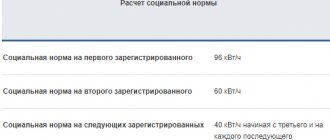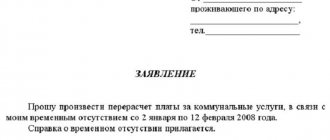The procedure for monitoring the management organization’s compliance with the terms of the management agreement for apartment buildings is one of the four essential conditions of the management agreement, without discussion of which the management agreement for apartment buildings will not be considered concluded (Part 3 of Article 162 of the Housing Code of the Russian Federation).
On November 15 and 17, at the webinar “How to provide for the risks of a management company in a management agreement,” Elena Shereshovets told how to correctly spell out in a management agreement the procedure for monitoring the fulfillment of the obligations of a management company.
How to update the data of the MKD technical passport
347420
Who controls the management organization
In Part 3 of Art. 162 of the Housing Code of the Russian Federation does not say that control over the implementation of the management agreement must be exercised by the owners. This article talks about the need to prescribe the procedure for implementing such control in the control system.
The following can monitor the execution of the management agreement for apartment buildings:
- owners of premises and their representatives;
- experts and auditors attracted by the owners.
The management organization can check the internal documents on its own or the SRO will do it if the MA is a member of the SRO. State supervisory authorities check the activities of the management organization for compliance with regulatory legal acts.
SROs and state supervisory authorities work according to their internal documents, so management organizations need to describe in the management agreement the procedure for monitoring by the owners.
Compulsory medical insurance carries out municipal housing control in relation to the housing authority in a building with municipal apartments
The municipality filed an appeal, stating its arguments:
- The current legislation does not contain a ban on the presence during the inspection of applicants based on whose requests it is carried out;
- the city administration conducted an inspection in relation to the management authority within the framework of municipal housing, and not licensing control: three apartments in the apartment building are municipal;
- ban on state housing supervision in relation to licensees, established in Part 7 of Art. 20 of the Housing Code of the Russian Federation does not apply to other types of housing control, including municipal control.
The Court of Appeal supported the local government, pointing out that Art. 14 of the Housing Code of the Russian Federation determines that the powers of such a body in the field of housing relations include, among other things, the implementation of municipal housing control. If there is at least one premises of the municipal housing stock in the apartment building, the compulsory medical insurance has the right to conduct an inspection of both this premises and the general property in the house (Part 1.1 of Article 20 of the Housing Code of the Russian Federation).
Municipal housing control is an independent activity. Provisions of Art. 20 of the RF Housing Code does not establish a ban on such control in relation to management entities managing apartment buildings under a license. At the same time, the compulsory health insurance company was not obliged to notify the prosecutor’s office: the basis for the inspection was the appeal of citizens about facts of violation of the management’s obligations under the management agreement (Part 4.2 of Article 20 of the Housing Code of the Russian Federation).
The conclusion of the court of first instance that persons not certified in accordance with the established procedure were involved in the implementation of control measures was also found to be erroneous. The presence of citizens living in the apartment building in respect of which the inspection was carried out does not contradict the provisions of No. 294-FZ and does not violate the rights and legitimate interests of the management authority.
The court determined that the municipality had the right to issue a mandatory order to ensure the safety and comfortable living of residents in the apartment building and the safety of the housing stock. The first instance decision was overturned and the UO's claim was dismissed. The Court of Cassation and the Supreme Court of the Russian Federation agreed with the correctness of these conclusions and refused to reconsider the appeal ruling.
Why is the compulsory medical insurance obliged to approve the amount of housing maintenance fees for the administrative authority?
Owner control
Control on the part of the owners is manifested in the fact that a representative of the owners can participate in the acceptance of work and services (paragraph 5, paragraph 4 of Rules No. 416). Thus, control by the owners is, first of all, the signing of work acceptance certificates.
The concept of an act of completed work existed before, but there was no form for such an act; everyone was drawn up differently. Now the situation has changed:
- Clause 9 of the RF PP No. 290 formalized the certificates of work performed as part of the technical documentation for the MKD. This means that the management organization cannot refuse to compile them.
- On February 16, 2021, Order No. 761/pr of the Ministry of Construction of the Russian Federation was issued - it approved the form of the act.
- Management organizations are required to disclose information about their activities on the Housing and Communal Services Reform and the State Information System of Housing and Communal Services; among other things, certificates of work performed are posted.
Certificates of completed work are the cornerstone in monitoring the implementation of the management contract. With their help, the management organization can prove that it completed the work efficiently and on time.
The procedure and timing for drawing up and signing an acceptance certificate for work performed
9273012
Acceptance certificates for completed work
The procedure for accepting work and services, the frequency of drawing up acceptance certificates for completed work are not established anywhere. Management organizations make decisions independently: some draw up acts monthly, others draw up acts once a year.
The second approach is considered more effective, because a management contract for apartment buildings is concluded for at least a year, a list of works is accepted within the year, and the contract price is approved for the year. Accordingly, it is more convenient to report annually.
The frequency of drawing up acceptance certificates for completed work can be stipulated in the MKD management agreement - set the deadline that is convenient for you. Once a year is enough.
If you have not specified the frequency in the management agreement, the norms of the Civil Code of the Russian Federation governing similar relations will be applied. According to Art. 720 of the Civil Code of the Russian Federation, the customer has the right to accept the work and report defects. Unless otherwise provided by the contract, the customer who accepted the work without inspection cannot in the future refer to defects in the work.
In paragraph 1 of the acceptance certificate for works and services, the following should be indicated:
- names,
- volume,
- prices,
- cost of work and services performed.
The price of the service or work reflected in the act must correspond to the amount of revenue under the management agreement recognized in the accounting and tax records of the management organization in the amount of the accrued fee for the maintenance and repair of the facility in the apartment building.
The Order of the Ministry of Construction on acceptance certificates for completed work comes into force
646745
Structure of the public services sector in the Moscow region: who calculates and controls the supply of housing and communal services
Often, residents of the Moscow region have questions about payment or shortfall in utility services, and they do not know which organization to contact. The MosObleIRC will answer questions related to the calculation of payments for housing and communal services. For other questions, please contact management companies or resource providers. Read about how the powers of management companies, settlement centers and other entities in the housing and communal services sector are divided in the material of the mosreg.ru portal.
How do the management company, the RSO and the settlement center interact?
Mosobleirts
Source: , press service of Deputy Chairman of the Government of the Moscow Region Dmitry Pestov
Every month, residents of the Moscow region receive a single payment document from MosOblEIRTS. It indicates accruals and debts/overpayments for all types of housing and utility services. However, not all consumers understand how functions in the housing and communal services sector are distributed between management and resource supply companies and MosOblEIRTS.
Water, gas and heat are supplied to homes directly by resource supply organizations (RSOs), which control the quality of the relevant resources. RSO has the right to enter into direct agreements with residents.
Management companies are engaged in the maintenance and ongoing repairs of residential buildings. If an appropriate agreement has been concluded, management companies (MCs) or the HOA organized in it are also responsible for the provision of utility services in an apartment building. In this case, all questions regarding payment or timely provision of housing and communal services should be addressed to the management company or the board of the HOA.
Questions regarding the maintenance and repair of gas equipment should be addressed directly to a specialized organization that provides maintenance and repair of VKGO. These services are provided, as a rule, on the basis of an agreement between the management company and a specialized organization.
Management companies and RSOs can organize the work of paying for services to consumers independently, or they can entrust this to a paying agent.
Such an agent is MosObleIRTs, which undertakes to maintain databases of personal accounts of payers, calculates, prints and delivers payment documents. In addition, the settlement center works with accounts receivable and monitors the timely receipt of funds into the accounts of resource and service providers. MosObleIRTs submits up to 17 reports to management companies every month - on accruals and payments on personal accounts, on accruals on service providers, on payers who did not transmit readings of individual metering devices, on collection of receivables, etc.
If it turns out that the services were incompletely provided to the consumer, the management company will send a notification to the Moscow Region EIRTS, which will recalculate. For clarification on charges, residents can contact the settlement center specialists directly.
Five most important projects in the Moscow region in the housing and communal services sector>>
What are the accruals based on?
Tariffs for housing and communal services
Source: Photobank of the Moscow region, Alla Fedina
Tariffs for cold, hot water supply and sanitation are set by the Committee on Prices and Tariffs of the Moscow Region.
Consumption standards are established by administrative documents of local governments and the Ministry of Housing and Communal Services of the Moscow Region.
The unified settlement center, as a payment agent, makes payments based on approved tariffs and standards, as well as data from management companies on the volume of services consumed, the number of residents, the area of occupied premises, etc.
As reported on the MosOblEIRTS website, the standards for the provision of utility services depend on the degree of improvement and deterioration of apartment buildings, their number of storeys, and the provision of sanitary equipment.
To find out what tariffs apply for the maintenance and repair of residential premises in a particular municipality, you can contact the management company or HOA or check the information on the official website of the local administration.
What should a resident of the Moscow region do if his apartment is flooded>>
Who controls housing and communal services providers
Badge of the State Housing Inspectorate of the Moscow Region
Source: Main Directorate of the State Housing Inspectorate of the Moscow Region
Direct control over the activities of HOAs and management companies is exercised by the State Housing Inspectorate.
She monitors how the common property of the owners of premises in an apartment building and in the surrounding areas is used, how the technical condition of houses is maintained and work on their maintenance and repair is carried out, how preparations are being made for the start of the winter and summer seasons, etc.
The inspectorate also receives complaints from the public. If the HOA or management company did not initially respond to the service consumer’s complaints, he needs to contact the housing inspectorate.
In addition, for clarification of questions about the legality of the actions of management companies, in addition to the State Housing Inspectorate, you can contact the local administration that maintains the register of management companies, or the resource supply organization with which the management company has an agreement.
How to pay for housing and communal services online in the Moscow region>>
Signing the work completion certificate
The certificate of completed work can be signed by the chairman of the MKD Council or an authorized person. There are situations when neither the chairman of the MKD Council nor the authorized person is selected or they are selected, but do not want to sign the acts.
Since RF PP No. 761 does not provide guidance for action, we recommend acting in accordance with Art. 7 Housing Code of the Russian Federation - by analogy. Include in the management agreement the possibility of signing the act unilaterally.
After signing the act unilaterally, you will only have to notify all owners of the premises about this. This can be done by posting information on an information board at the entrance.
In the management agreement or in the act itself, make a note about the procedure for signing acts of completed work for the owners: indicate that they have thirty days to agree or write a reasoned refusal.
To draw up such a refusal, the owners conduct an OSS, at which they draw up a report with claims to the quality, timing and volume of work performed. This act is then sent to the management organization. If there is no act, the work and services are considered completed in full and in due time and accepted by the owners.
We recommend that the management agreement provide for a situation in which the chairman of the MKD Council and an authorized person are selected, but they do not make contact. Write that if these persons are absent or they receive an unmotivated refusal to sign the act, the management organization has the right to sign this act with any owner.
Calculation of costs for maintenance and current repairs of equipment in multi-unit apartment buildings: 5 practical tips
162091
Why will the managers of the management organization pay residents’ debts from their personal pockets?
Many heads of management organizations still think that they are responsible only to the participants (founders) of the company and that everything they do or, on the contrary, do not do in the company, is not their will and not their area of responsibility, and the consequences can be avoided.
In Russia, in general, most problems are solved by saying: “it will somehow resolve itself.”
In turn, participants (founders) of organizations for the obligations of their company have a firm belief that their liability is limited only by their shares in the authorized capital (Article 87 of the Civil Code of the Russian Federation).
If problems arise, the director blames everything on the founders, and they, in turn, believe that the director will answer for the debts.
The legislator for a long time and with its inherent creaks (not to be confused with clamps) significantly tightened the provisions of the law on subsidiary liability, and in 2021, by introducing amendments to the law “On Insolvency (Bankruptcy)” dated October 26, 2002 No. 127-FZ, aimed at significant simplification of the procedure for bringing to subsidiary liability.
In fact, now LLC participants and executive bodies (managers) are liable for business debts with all their property, as individual entrepreneurs.
By virtue of paragraph 1 of Article 9 of the Bankruptcy Law, the head of the debtor is obliged to apply to the arbitration court if:
— satisfaction of the claims of one creditor or several creditors leads to the impossibility of the debtor fulfilling monetary obligations or obligations to pay obligatory payments and (or) other payments in full to other creditors;
- the body of the debtor, authorized in accordance with its constituent documents to make a decision on the liquidation of the debtor, made a decision to apply to the arbitration court with an application from the debtor;
- the body authorized by the owner of the property of the debtor - a unitary enterprise, made a decision to apply to the arbitration court with an application from the debtor;
— foreclosure on the debtor’s property will significantly complicate or make impossible the debtor’s business activities;
- the debtor meets the signs of insolvency and (or) signs of insufficient property;
- there is an outstanding debt for more than three months due to insufficient funds in the payment of severance pay, wages and other payments due to the employee, former employee in the amount and in the manner established in accordance with labor legislation;
The subject of proof in disputes about holding managers liable under paragraph 1 of Article 61.12 of the Bankruptcy Law includes establishing the following circumstances:
— the occurrence of one of the conditions listed in paragraph 1 of Article 9 of the Law;
— the moment of occurrence of this condition;
- the fact that the manager did not file an application for bankruptcy of the debtor with the court within a month from the date the corresponding condition arose;
- the volume of the debtor’s obligations that arose after the expiration of the month period provided for in paragraph 2 of Article 9 of the Bankruptcy Law.
When studying the totality of these circumstances, it should be taken into account that the obligation to apply to the court for bankruptcy arises at the moment when a conscientious and reasonable manager, within the framework of standard management practice, should have objectively determined the presence of one of the circumstances mentioned in paragraph 1 of Article 9 of the Bankruptcy Law .
Thus, in order to bring to subsidiary liability under paragraph 1 of Article 61.12 of the Bankruptcy Law, the following must be proven:
— the date when the manager became obligated to apply to the arbitration court to declare the debtor bankrupt;
- the applicant must indicate which of the cases provided for in paragraph 1 of Article 9 of the Bankruptcy Law should have been the basis for going to court (in the case under consideration, the applicant indicates the circumstances of the debtor having signs of insolvency and (or) signs of insufficient property;
— exactly what obligations arose after the expiration of the deadlines provided for in paragraph 2 of Article 9 of the Bankruptcy Law.
Failure to prove at least one of these circumstances entails refusal to satisfy the application for subsidiary liability.
In accordance with paragraph. 2 clause 11 art. 61.11 of the Federal Law “On Insolvency (Bankruptcy)”, the amount of subsidiary liability of a controlling debtor of a person is subject to a corresponding reduction if it is proven that the amount of damage caused to the property rights of creditors through the fault of this person is significantly less than the amount of claims to be satisfied at the expense of this controlling debtor of a person .
By virtue of paragraph 2 of Article 401 of the Civil Code of the Russian Federation, the absence of guilt is proven by the person brought to subsidiary liability.
A living example for the housing and communal services sector, when the management of a management organization is involved, is case No. A40-227344/18 (https://kad.arbitr.ru/Card/6815b53e-31d8-4d64-a0b6-1e64fb15ce61), where the application of PJSC MOEK was considered » on bringing to subsidiary liability two managers: Kirpichev A.S. and Nikolaeva N.M., as well as a member of LLC Smolyaninov M.N. for the obligations of LLC "UK ZHKH Pervomaiskoe" in the amount of about 7 million rubles.
The court found that the company’s activities for the period since 2013 have been unprofitable; since April 2015, LLC “UK ZHKH Pervomaiskoe” has not managed a single house; the amount of accounts payable at the end of the reporting year 2014 is 178.83% in relation to accounts receivable debt for the reporting year 2015 is 198.3% in relation to accounts receivable.
The defendants did not provide the necessary evidence that they took actions aimed at resolving the current negative situation, both to combat debtors and to take the necessary actions in terms of filing a bankruptcy petition.
The Arbitration Court of the city of Moscow satisfied the requirements of PJSC MOEK, and the courts of appeal and cassation (including the Supreme Court of the Russian Federation) left the court's decision unchanged.
Only the sole participant of the LLC managed to avoid liability.
This is understandable, no evidence was collected regarding the participants of the companies, and the resolution of the Constitutional Court of the Russian Federation No. 39 dated December 8, 2017 states that in the general case it is impossible to recover the debts of an operating company from a controlling debtor.
However, the judges made a reservation: recovery is possible if the organization’s activities are fictitious and serve only as a “cover” for dishonest actions of its owners.
You need to fight with debtors and pay off your debts “yesterday”, because not today, but tomorrow, creditors will take advantage of the positive practice of subsidiary liability of the heads of organizations and by the time the debt is paid, you, as a current or former head of a bankrupt company, will find yourself with a broken trough with huge debt.
Be carefull!
Kuzmin Denis Nikolaevich (Lawyer for housing and communal services)
Especially for the telegram channel ZHKH-24: https://t.me/gkhlaw
Subscribe and spread the word.
This is very important to us!
Claims from unauthorized persons
According to the Law on the Protection of Consumer Rights, all owners of premises in apartment buildings can express their complaints to the management organization.
The owner as a customer has the right to exercise control and supervision over:
- progress and quality of work performed,
- meeting deadlines,
- quality of materials supplied by the contractor,
- correct use of materials.
To prevent control and supervision on the part of the owners from turning into absurdity, we recommend that it be written in the management regulations that the owners carry them out without interfering in the operational and economic activities of the contractor.
We also recommend that you specifically indicate the following point in the DU: if the customer discovers any errors in the work, he must report them immediately. If there is no such statement, the customer loses the future right to refer to the deficiencies discovered by him.
The GZHN body carries out licensing control over the MA
The court of first instance sided with the management organization, agreeing with its arguments. The judge noted that, according to the act, two owners of premises in the apartment building participated in the inspection, but in the order to conduct it they were not indicated as authorized persons.
Apartment owners do not have special knowledge or experience in the relevant field of science, technology, or economic activity and are not certified in the manner established by the Government of the Russian Federation. Consequently, the municipality had no reason to involve the residents of the house in the inspection.
According to Part 7 of Art. 20 of the Housing Code of the Russian Federation, state housing supervision is not carried out in relation to the MA, only licensing control. Only the State Housing Supervision bodies, which include the State Housing Property Inspectorate of the Bryansk Region, have the right to do this (Articles 20, 192, 196 of the Housing Code of the Russian Federation). The court indicated that the city administration does not have the legal basis to conduct an inspection of the licensing activities of the management company.
At the same time, an unscheduled on-site inspection based on a citizen’s complaint can only take place after approval in the prescribed manner with the prosecutor’s office. Only the State Housing Inspectorate has the right to carry out such measures in relation to licensees without prior notification and approval from the prosecutor’s office (Part 3 of Article 196 of the Housing Code of the Russian Federation).
Based on these findings, the court of first instance declared the order issued by the municipality in relation to the educational institution illegal. The dispute moved to the appellate court.
Does the compulsory medical insurance, upon application from the administrative authority, approve the amount of payment for housing maintenance?






